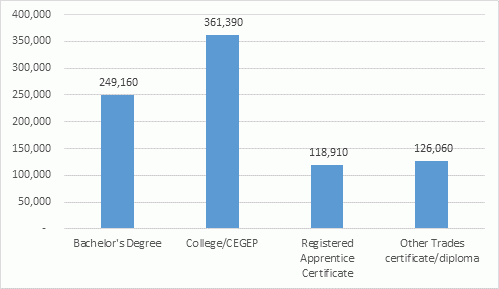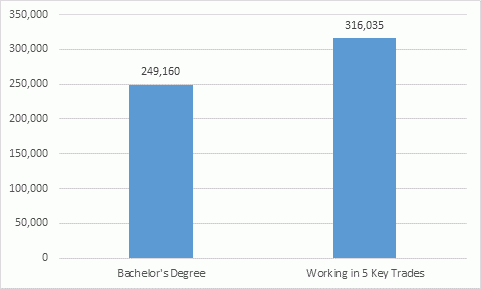So, Ken Coates of the University of Saskatchewan published a paper the week before last arguing that there were too many university students and not enough trades students, so we should reduce university enrolments by a third and what the hell is wrong with kids today anyway? Despite being not much more than a warmed-over version of the paper he co-authored with Rick Miner in IRPP a couple of years ago, it got some attention because it played directly into both the elitist view of universities (all these students devalue the degree!) and the weird view some in Canada have that the only problem with the labour market is that workers are too stupid to see the opportunities in front of them.
The paper is a hot mess of unfounded assertions and questionable logic which raises at least 5 questions (I’d guess readers can come up with a few more of their own) which I think the author needs to answer before the paper can be taken seriously.
1.Why does Coates keep saying today’s young people feel too “entitled”? What does he mean by this disparaging term? What evidence is there to suggest this generation display a greater sense of entitlement than any previous generation? Or is this just an arrogant way of saying youth don’t do what Coates thinks they should do? (Also: does Coates spend a lot of time yelling at kids to get off his lawn?)
2. Why does Coates repeatedly denigrate the idea that “the labour market should be directed by the uninformed educational choices of 17-19 year-olds”? Has it not ever been thus? Was there some golden age in Canadian history when the state or business made career decisions on young peoples’ behalf and where economic outcomes were demonstrably better? Can Coates name a democratic nation where 17-19 year-olds don’t make their own educational choices?
3. Why, if as Coates claims, no one can know the future of the labour market, is he so damn sure we need more college/trades graduates? Coates: “it is extremely difficult to anticipate downstream market demand for employees”. Coates: “Governments have a poor track record when it comes to picking winners in the economy”. Well, if that’s true, isn’t this entire paper – which based on the idea that we know that more college/trades education and less university education is a good idea – an enormous waste of time? (Or, more simply, “wrong”?)
4. What evidence does Coates have for saying Canadians are defaulting “to the traditional view that a university degree is the best avenue to prosperity” and “turning their children’s dreams against blue-collar work”? Here’s a quick summary of educational attainment for Canadian males, aged 30 or under, who did their post-secondary education in Canada:
Figure 1: Highest Level of Educational Attainment, Males Aged 30 and Under, Canada, 2010
Figure 2: Bachelor’s Degree Holders vs. Workers in Five Key Trades, Males under 30, Canada, 2010
Coates does have a point in that universities need to do more to make their graduates employable, and he’s also right that more post-secondary learning needs to be experiential in nature. But to go from there and say that we need fewer university graduates is just a baseless assertion. He can and should do better.



 Tweet this post
Tweet this post

A sixth question.
If university enrolments are reduced by one third, would you expect:
a) academic salaries to fall by one third
b) class sizes to fall by one third
c) one third of faculty positions to be eliminated
d) none of the above: the university can stop hiring contract instructors, and balance the books by cutting the bloated and expensive university administration.
Hi Frances. Actually, Coates recommends keeping public funding unchanged even after getting rid of the extra students.
I know comment sections are supposed to be for commenting, but just wanted to say I love your blog and this post is amazing. I don’t know how you can keep putting out such great pieces every day and keep your day job, but please don’t ever stop.
Also there’s a typo in your penultimate paragraph (know vs now).
Thanks. Typo fixed – thanks for that too!
Baby boomers complaining about the kids these days feeling entitled is literally the best thing ever. Bonus points for calling for a national strategy in the title of the paper. This is, like, mega-trolling, right?
I didn’t want to touch the ludicrousness of that. I don’t understand why, if AB and SK have an LM problem (as they did two years ago when most of this was written), we suddenly need a national strategy.